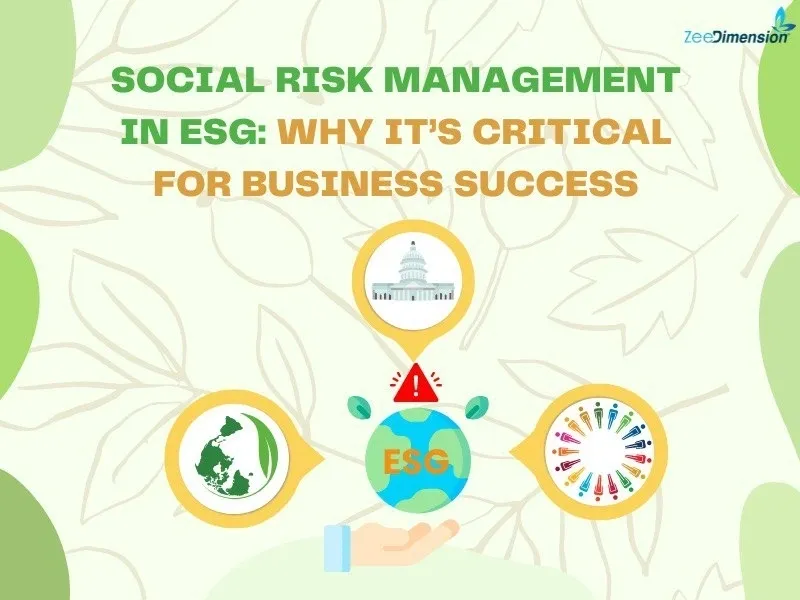
Social risks have become a crucial part of ESG, requiring businesses to proactively address their impact on stakeholders to ensure sustainable growth and resilience.
What Are Social Risks?
Social risks within Environmental, Social, and Governance (ESG) frameworks encompass a range of factors that can significantly impact a company’s reputation and operational sustainability. These risks include issues related to labor rights and working conditions, where mistreatment of staff can result in legal challenges and discontent among employees. Human rights considerations within the supply chain are also paramount, requiring companies to ensure that their suppliers adhere to ethical practices and do not partake in activities like child labor or forced labor. Moreover, upholding stringent health and safety standards is crucial to safeguard employees from workplace dangers and mitigate legal risks. Embracing diversity, equity, and inclusion (DEI) fosters a welcoming environment that values all team members, a fundamental aspect for fostering innovation and retaining talent. Lastly, community relations and impact signify a company’s obligation to engage positively with the communities it serves, ultimately enhancing its social standing and fostering goodwill. Effectively managing these social risks is essential for promoting sustainable business practices and ensuring enduring success in the long run.
Why Should Companies Care About Social Risks?
It is crucial for companies to prioritize social risks as neglecting them can result in severe adverse effects, such as damage to their reputation, legal repercussions, operational disruptions, and heightened investor scrutiny. A tarnished reputation stemming from substandard labor practices or human rights violations can drive away customers and diminish brand loyalty. Non-compliance with labor laws or health and safety regulations may lead to legal penalties, causing financial setbacks and operational hitches. Furthermore, disregarding social risks can lead to disruptions in day-to-day activities, whether due to strikes, high turnover rates among employees, or backlash from the community. Lastly, companies that fail to address social risks may encounter challenges in attracting investments or securing favorable financing terms as investors increasingly scrutinize social practices. In today’s competitive environment, addressing social risks is paramount for safeguarding a company’s reputation, ensuring adherence to regulations, and fostering sustainable development.
Top 5 Tips to Better Manage Social Risks in Your Companie :
1- Conduct a detailed social risk assessment to pinpoint potential vulnerabilities and areas for enhancement. This fundamental step will enable a deeper understanding of the specific challenges confronting your organization.
2- Proactively engage with stakeholders, including employees, suppliers, and community members, to gather insights and promote transparent communication.
3- Establish comprehensive policies and programs that target identified social risks, ensuring alignment with best practices and legal mandates.
4- Incorporate social metrics into your ESG reporting to offer a transparent overview of your performance and accountability in these areas.
5- Collaborate with industry and regulatory bodies to remain abreast of evolving standards and exchange best practices. By implementing these strategies, your company can effectively mitigate social risks and contribute to a more sustainable and ethical business environment.
Case Studies in Social Risk Management: Unilever and Patagonia
Case Study: Unilever
Unilever is a leader in social risk management by improving labor practices and engaging with local communities throughout its global supply chain.
Result? A stronger reputation and enhanced trust.
Case Study: Patagonia
Patagonia prioritizes both social and environmental responsibility, ensuring fair trade and adherence to human rights across its supply chain.
Outcome? Increased brand loyalty and sustained success.
The Future of Social Risk Management in ESG
The importance of social risk management in ESG is becoming increasingly crucial as consumer, investor, and regulatory demands continue to escalate. Companies that actively address social risks will be better equipped to shield themselves from financial and reputational damage, thereby mitigating the potential repercussions of neglecting labor practices or human rights issues. By embracing proactive strategies for managing social risks, these organizations can access growth opportunities, as consumers increasingly gravitate towards brands that prioritize ethical practices and social responsibility. Additionally, effective social risk management contributes to creating a positive social impact, nurturing healthier communities and fostering fair practices across supply chains. As the business landscape evolves, companies that prioritize social risks will not only bolster their sustainability but also gain a competitive advantage in the market.
Proactively managing social risks as part of an ESG strategy is key to building a resilient and socially responsible business. It’s not just about mitigating risks—it’s about creating value for all stakeholders.







